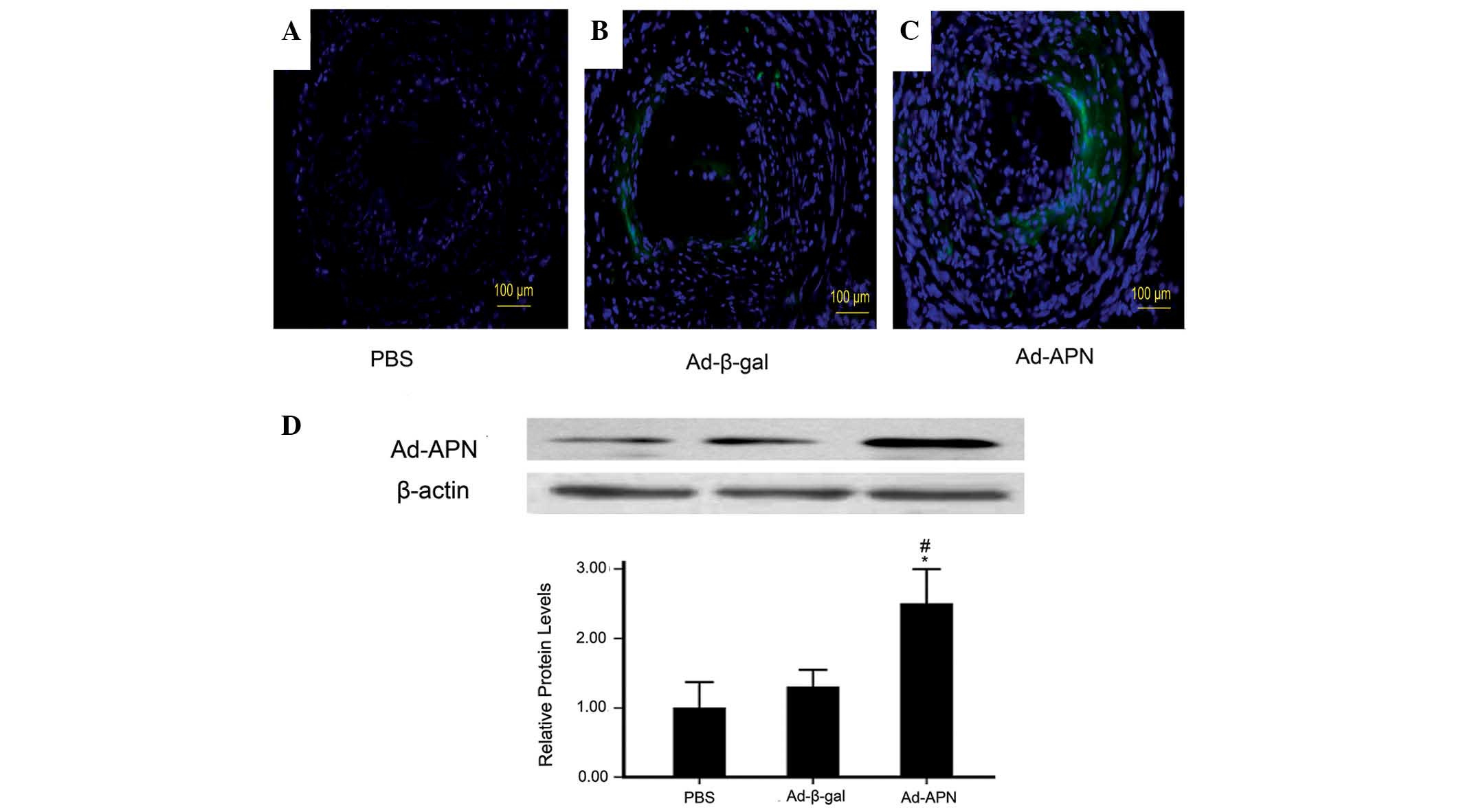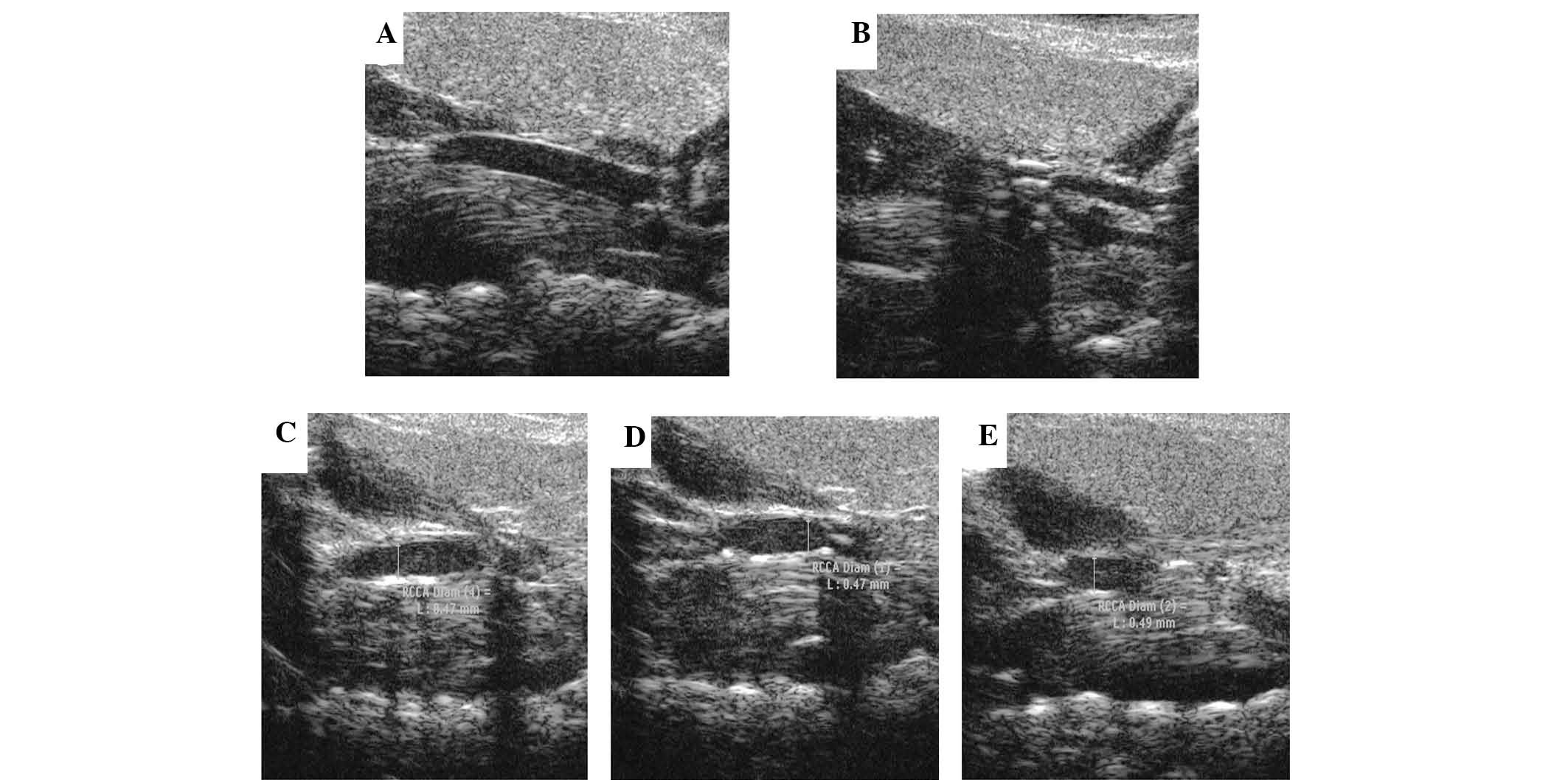|
1
|
Li R, Wang WQ, Zhang H, et al: Adiponectin
improves endothelial function in hyperlipidemic rats by reducing
oxidative/nitrative stress and differential regulation of eNOS/iNOS
activity. Am J Physiol Endocrinol Metab. 293:E1703–E1708. 2007.
View Article : Google Scholar : PubMed/NCBI
|
|
2
|
Okui H, Hamasaki S, Ishida S, et al:
Adiponectin is a better predictor of endothelial function of the
coronary artery than HOMA-R, body mass index, immunoreactive
insulin, or triglycerides. Int J Cardiol. 126:53–61. 2008.
View Article : Google Scholar
|
|
3
|
Lee S, Park Y, Dellsperger KC and Zhang C:
Exercise training improves endothelial function via
adiponectin-dependent and independent pathways in type 2 diabetic
mice. Am J Physiol Heart Circ Physiol. 301:H306–H314. 2011.
View Article : Google Scholar : PubMed/NCBI
|
|
4
|
Lee S, Zhang H, Chen J, Dellsperger KC,
Hill MA and Zhang C: Adiponectin abates diabetes-induced
endothelial dysfunction by suppressing oxidative stress, adhesion
molecules, and inflammation in type 2 diabetic mice. Am J Physiol
Heart Circ Physiol. 303:H106–H115. 2012. View Article : Google Scholar : PubMed/NCBI
|
|
5
|
Ouchi N, Ohishi M, Kihara S, et al:
Association of hypoadiponectinemia with impaired vasoreactivity.
Hypertension. 42:231–234. 2003. View Article : Google Scholar : PubMed/NCBI
|
|
6
|
Arita Y, Kihara S, Ouchi N, et al:
Paradoxical decrease of an adipose-specific protein, adiponectin,
in obesity. Biochem Biophys Res Commun. 257:79–83. 1999. View Article : Google Scholar : PubMed/NCBI
|
|
7
|
Ouchi N, Kihara S, Arita Y, et al: Novel
modulator for endothelial adhesion molecules: adipocyte-derived
plasma protein adiponectin. Circulation. 100:2473–2476. 1999.
View Article : Google Scholar : PubMed/NCBI
|
|
8
|
Hotta K, Funahashi T, Arita Y, et al:
Plasma concentrations of a novel, adipose-specific protein,
adiponectin, in type 2 diabetic patients. Arterioscler Thromb Vasc
Biol. 20:1595–1599. 2000. View Article : Google Scholar : PubMed/NCBI
|
|
9
|
Okamoto Y, Kihara S, Ouchi N, et al:
Adiponectin reduces atherosclerosis in apolipoprotein E-deficient
mice. Circulation. 106:2767–2770. 2002. View Article : Google Scholar : PubMed/NCBI
|
|
10
|
Muscoli C, Cuzzocrea S, Riley DP, et al:
On the selectivity of superoxide dismutase mimetics and its
importance in pharmacological studies. Br J Pharmacol. 140:445–460.
2003. View Article : Google Scholar : PubMed/NCBI
|
|
11
|
Lautamäki R, Rönnemaa T, Huupponen R, et
al: Low serum adiponectin is associated with high circulating
oxidized low-density lipoprotein in patients with type 2 diabetes
mellitus and coronary artery disease. Metabolism. 56:881–886. 2007.
View Article : Google Scholar : PubMed/NCBI
|
|
12
|
Furukawa S, Fujita T, Shimabukuro M, et
al: Increased oxidative stress in obesity and its impact on
metabolic syndrome. J Clin Invest. 114:1752–1761. 2004. View Article : Google Scholar : PubMed/NCBI
|
|
13
|
Ouedraogo R, Wu X, Xu SQ, et al:
Adiponectin suppression of high-glucose-induced reactive oxygen
species in vascular endothelial cells: evidence for involvement of
a cAMP signaling pathway. Diabetes. 55:1840–1846. 2006. View Article : Google Scholar : PubMed/NCBI
|
|
14
|
Motoshima H, Wu X, Mahadev K and Goldstein
BJ: Adiponectin suppresses proliferation and superoxide generation
and enhances eNOS activity in endothelial cells treated with
oxidized LDL. Biochem Biophys Res Commun. 315:264–271. 2004.
View Article : Google Scholar : PubMed/NCBI
|
|
15
|
Li R, Wang WQ, Zhang H, et al: Adiponectin
improves endothelial function in hyperlipidemic rats by reducing
oxidative/nitrative stress and differential regulation of eNOS/iNOS
activity. Am J Physiol Endocrinol Metab. 293:E1703–E1708. 2007.
View Article : Google Scholar : PubMed/NCBI
|
|
16
|
Tao L, Gao E, Jiao X, et al: Adiponectin
cardioprotection after myocardial ischemia/reperfusion involves the
reduction of oxidative/nitrative stress. Circulation.
115:1408–1416. 2007. View Article : Google Scholar : PubMed/NCBI
|
|
17
|
Cai XJ, Chen L, Li L, et al: Adiponectin
inhibits lipopolysaccharide-induced adventitial fibroblast
migration and transition to myofibroblasts via AdipoR1-AMPK-iNOS
pathway. Mol Endocrinol. 24:218–228. 2010. View Article : Google Scholar
|
|
18
|
Li L, Cai XJ, Feng M, et al: Effect of
adiponectin overexpression on stability of preexisting plaques by
inducing prolyl-4-hydroxylase expression. Circ J. 74:552–559. 2010.
View Article : Google Scholar : PubMed/NCBI
|
|
19
|
Zhao ZQ, Corvera JS, Halkos ME, et al:
Inhibition of myocardial injury by ischemic postconditioning during
reperfusion: comparison with ischemic preconditioning. Am J Physiol
Heart Circ Physiol. 285:H579–H588. 2003.PubMed/NCBI
|
|
20
|
Tao L, Liu HR, Gao E, et al:
Antioxidative, antinitrative, and vasculoprotective effects of a
peroxisome proliferator-activated receptor-gamma agonist in
hypercholesterolemia. Circulation. 108:2805–2811. 2003. View Article : Google Scholar : PubMed/NCBI
|
|
21
|
Sulistyoningrum DC, Gasevic D, Lear SA, Ho
J, Mente A and Devlin AM: Total and high molecular weight
adiponectin and ethnic-specific differences in adiposity and
insulin resistance: a cross-sectional study. Cardiovasc Diabetol.
12:1702013. View Article : Google Scholar : PubMed/NCBI
|
|
22
|
Rabe K, Lehrke M, Parhofer KG and Broedl
UC: Adipokines and insulin resistance. Mol Med. 14:741–751. 2008.
View Article : Google Scholar : PubMed/NCBI
|
|
23
|
Fisman EZ and Tenenbaum A: Adiponectin: a
manifold therapeutic target for metabolic syndrome, diabetes, and
coronary disease? Cardiovasc Diabetol. 13:1032014. View Article : Google Scholar : PubMed/NCBI
|
|
24
|
Wang X, Pu H, Ma C, et al: Adiponectin
abates atherosclerosis by reducing oxidative stress. Med Sci Monit.
20:1792–1800. 2014. View Article : Google Scholar : PubMed/NCBI
|
|
25
|
Essick EE, Wilson RM, Pimentel DR, et al:
Adiponectin modulates oxidative stress-induced autophagy in
cardiomyocytes. PLoS One. 8:e686972013. View Article : Google Scholar : PubMed/NCBI
|
|
26
|
Zoccali C, Mallamaci F, Tripepi G, et al:
Adiponectin, metabolic risk factors, and cardiovascular events
among patients with end-stage renal disease. J Am Soc Nephrol.
13:134–141. 2002.
|
|
27
|
Shimabukuro M, Higa N, Asahi T, et al:
Hypoadiponectinemia is closely linked to endothelial dysfunction in
man. J Clin Endocrinol Metab. 88:3236–3240. 2003. View Article : Google Scholar : PubMed/NCBI
|
|
28
|
Tan KC, Xu A, Chow WS, et al:
Hypoadiponectinemia is associated with impaired
endothelium-dependent vasodilation. J Clin Endocrinol Metab.
89:765–769. 2004. View Article : Google Scholar : PubMed/NCBI
|
|
29
|
Fernández-Real JM, Castro A, Vázquez G, et
al: Adiponectin is associated with vascular function independent of
insulin sensitivity. Diabetes Care. 27:739–745. 2004. View Article : Google Scholar : PubMed/NCBI
|
|
30
|
Okamoto Y, Arita Y, Nishida M, et al: An
adipocyte-derived plasma protein, adiponectin, adheres to injured
vascular walls. Horm Metab Res. 32:47–50. 2000. View Article : Google Scholar : PubMed/NCBI
|
|
31
|
Gozin A, Franzini E, Andrieu V, et al:
Reactive oxygen species activate focal adhesion kinase, paxillin
and p130cas tyrosine phosphorylation in endothelial cells. Free
Radic Biol Med. 25:1021–1032. 1998. View Article : Google Scholar : PubMed/NCBI
|
|
32
|
Huie RE and Padmaja S: The reaction of NO
with superoxide. Free Radic Res Commun. 18:195–199. 1993.
View Article : Google Scholar : PubMed/NCBI
|
|
33
|
Beckman JS and Koppenol WH: Nitric oxide,
superoxide, and peroxynitrite: the good, the bad, and the ugly. Am
J Physiol Cell Physiol. 271:C1424–C1437. 1996.
|
|
34
|
Margaritis M, Antonopoulos AS, Digby J, et
al: Interactions between vascular wall and perivascular adipose
tissue reveal novel roles for adiponectin in the regulation of
endothelial nitric oxide synthase function in human vessels.
Circulation. 127:2209–2221. 2013. View Article : Google Scholar : PubMed/NCBI
|
|
35
|
Zheng Q, Yuan Y, Yi W, et al:
C1q/TNF-related proteins, a family of novel adipokines, induce
vascular relaxation through the adiponectin
receptor-1/AMPK/eNOS/nitric oxide signaling pathway. Arterioscler
Thromb Vasc Biol. 31:2616–2623. 2011. View Article : Google Scholar : PubMed/NCBI
|
|
36
|
Li R, Xu M, Wang X, et al: Reduced
vascular responsiveness to adiponectin in hyperlipidemic rats -
mechanisms and significance. J Mol Cell Cardiol. 49:508–515. 2010.
View Article : Google Scholar : PubMed/NCBI
|


















